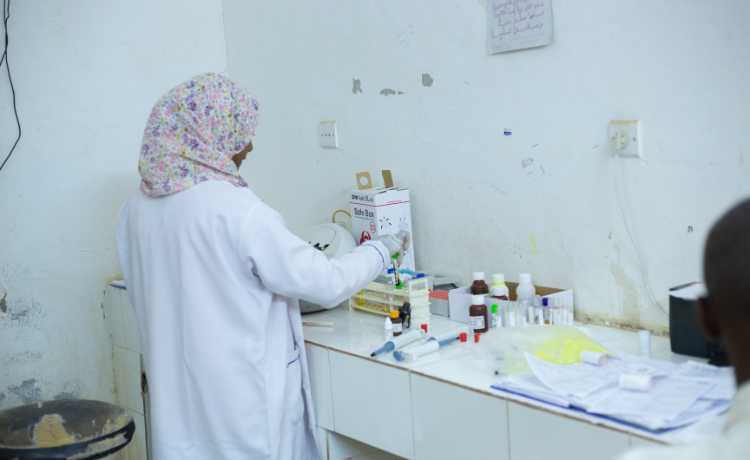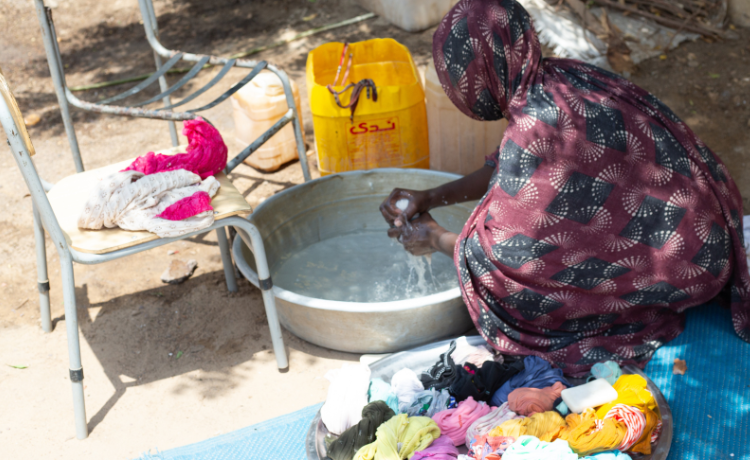News
“I witnessed unimaginable horrors”: Sexual violence used as weapon of terror against women and girls across Sudan
- 02 April 2025
News
NORTHERN STATE, Sudan – In late 2024, armed men forced their way into Layla’s* home in Khartoum, the capital of Sudan, while she was alone with her children. “They arrested my son and took me to a separate car,” she told UNFPA, the United Nations sexual and reproductive health agency.
“I noticed they were looking at my daughter in a disturbing way – she’s 18 years old. Probably they took me away to keep her alone.”
Layla’s fears for her daughter were a precursor of what she would later confront at an overcrowded prison, where she was held for nearly three weeks. “They brought my son back and started beating him in front of me. Then they took me to where they kept women prisoners, interrogating me, accusing me of being a spy and claiming that my husband worked for the army.”
Over 12 million women and girls in Sudan are at risk of sexual violence
Although the Sudanese army has recently retaken strategic areas of Khartoum, at that time opposition paramilitary forces were in control. Layla described being strip-searched, beaten and detained without charge.
“I witnessed unimaginable horrors,” she said. “When the officers left, the soldiers would begin raping prisoners. They would take young women out into the yard, and all night long we would hear the screams of girls and women.”
“I heard those screams for all 19 days I was in that prison.”
During the war, there have been increasing and alarming reports of sexual violence being used as a weapon of terror across Sudan. Over 12 million women and girls – and increasingly men and boys – are estimated to be at risk of assault, an 80 per cent increase from the previous year.
A growing health crisis

Since the outbreak of the war in April 2023, the situation has worsened dramatically, with almost 13 million people forcibly displaced – nearly one third of the population – and the health system all but obliterated. UNFPA is providing reproductive health and protection services through 90 mobile health teams, more than 120 health facilities, and 51 safe spaces where survivors of sexual violence can seek help and refuge anonymously.
“I heard those screams for all 19 days I was in that prison.”
This assistance includes clinical treatment and psychological counselling following rape, sexual abuse and assault, as well as referrals for legal assistance and awareness raising among communities of the risks of sexual violence, coercion and trafficking.
At a UNFPA-supported safe space, Layla explained how she struggled to endure the ordeal in prison. “One day, a 16-year-old girl was brought back to the cell, bleeding heavily,” she recalled. “She came to me, hugged me, and we cried together for an entire day.”
“By the ninth day I decided I wanted to die – I couldn't bear the thought of being raped as well. So I stopped eating and drinking, eventually becoming very sick, and they released me.”
Although Layla and the young survivor were able to find physical and mental health support through the safe space, they are not among the majority. There have been more than 540 attacks on health facilities reported over the last two years, supplies and equipment are frequently looted, and health workers, patients and ambulances are targeted with violence and intimidation.
An urgent call for support

Maha Mahmoud, a social worker at a UNFPA-supported safe space in Dongola in the Northern State, said health facilities are no longer safe havens.
Unprecedented funding cuts are hitting the people of Sudan just when the needs have never been higher
“I was informed that a young woman had been raped at a maternity hospital,” she told UNFPA. “She’s 18, divorced with one daughter and had been living with her family when opposition forces entered her area. They took her, along with many other women, and raped them.”
“She lost consciousness. When she woke up, she found herself surrounded by other girls, all of whom had also been raped. They were then left in the street.”
The woman would later discover she was pregnant. “She made her way to the safe space, where we provided her with psychological support and all the necessary medical care,” said Ms. Mahmoud, adding that the woman and her baby are slowly recovering. “Since then, we have continued to help her cope with the trauma.”
In 2025, UNFPA is calling for $119.6 million for its work in Sudan and a further $26 million to assist refugees in the country. In the Northern State, UNFPA’s sexual and reproductive health programmes and safe spaces operate with funding from Canada, the European Union, Japan, Norway, Sweden and the United Kingdom. Yet unprecedented funding cuts by many donors are throwing into jeopardy the health and lives of hundreds of thousands of women and girls.
The United States has been a crucial supporter of the people of Sudan, but recent funding terminations will leave some 250,000 women without reproductive health services. Training for frontline medical workers has also been halted, and 10,000 women will lose access to safe spaces that provide medical, legal, and psychosocial support.